I started devouring books around second grade and by around fifth grade, I was reading adult fiction along with young adult and middle grade fiction. After lots and lots of fiction, it was a non-fiction book that first offered me that siren’s call to writing my own stories. I was thirteen years old. It was an old textbook and after reading just one essay, I knew I had to be a writer. I started writing stories out by hand and then enrolled in a typing class as soon as I was allowed to. I got a little portable manual typewriter and started submitting manuscripts. I had a dozen rejection slips before I gave it up and ran away to join the ministry.
After a decade immersed in that, I came back to it in my later twenties. It must have stuck because here we are, twenty years after I started getting serious about writing, and I’ve got some books of my own out in the world. Looking back across those two decades, I can see the writing books that really helped me stretch and grow and find my storytelling legs. I talk about them a bit below, introducing each with a quote to give you a bit of each book’s flavor.
On Writing, By Writers edited by William W. West
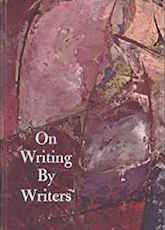
By living well, by observing as you live, by reading well and observing as you read, you have fed Your Most Original Self. By training yourself in writing, by repetition exercise, imitation, good example, you have made a clean, well-lighted place to keep the Muse. You have given her, him, it, or whatever, room to turn around in. And through training, you have relaxed yourself enough not to stare discourteously when inspiration comes into the room. —Ray Bradbury
This is that textbook I mentioned above. My Mom was an Avon Lady in the little logging town we lived in, and I often tagged along when she was making sales and delivery calls. One of those customers had books—lots of books—and I started with this one because it had Ray Bradbury in it (along with lots of other writers). It had essays by the authors followed by stories. His essay, “How to Keep and Feed a Muse,” grabbed hold of me and made me want to be a writer. I took his advice from the essay—I started reading poetry and started writing stories. I leaned in toward a thousand words a day. I kept my comic books, learning from his experience with Buck Rogers, and still have them to this day. Anchors into language and wonder. More than any other book, this one made me a writer. It’s out of print now but the essay was collected in Zen in the Art of Writing along with several other awesome Bradbury essays.
Writing to the Point by Algis Budrys
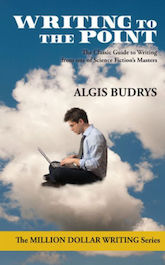
A glance at a handful of best-sellers chosen at random will confirm the truth of this: there is no relationship between the degree of what most people call skill and the number of copies sold. Some are well-written, some are not. The thing they have in common is not good writing: it is the ability to create patterns in the plot. In other words, the important skill is not writing: it is writing. —Algis Budrys
I ran across this one in a secondhand store after it was already out of print. It’s back in print now thanks to Kevin J. Anderson’s Wordfire Press. I didn’t get around to reading it until a few years after I hit “pro” status in my writing but when I did, I realized that I could’ve gotten there sooner and better if I’d started with this one. Budrys lays out one of the simplest, most useful paths toward creating functional, publishable fiction I have ever seen.
If I were starting my career up today, I’d write a story a month using his process for a year and see what it did to my craft. And I’d put those stories in the mail. And then I’d keep doing it until the rejection letters turned into checks and contributor copies.
Around the Writer’s Block by Roseanne Bane
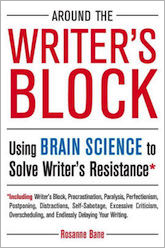
You are not being weak willed, thin-skinned, oversensitive, underdisciplined, or lazy. You are reacting to a subconscious awareness of a potential threat. In fact, your cortex is probably far more consistent about showing up for your writing than you give yourself credit for. That is, your cortex is consistent when it’s in charge, which is less often than your cortex recognizes. —Roseanne Bane
Over the course of writing The Psalms of Isaak, I found myself riddled with severe PTSD during a series of major life changes and losses. And I experienced a type of writer’s block I’d never encountered before as I stalled out several times through four of the five books. Dale Ivan Smith pointed me toward this book and it helped get my writing back on the road. Bane combines practical exercises with some basic neuroscience to give me three key takeaways: 1. Do some kind of process-type activity for 15 minutes before writing (coloring, knitting, playing piano) to prep your brain for writing; 2). Only commit to fifteen minutes of writing at a time (with the caveat that you can keep going if you want to – and you usually want to); and 3. Take care of yourself.
It showed up at just the right time and helped me get back to work. If you’re writing, you’ll want this one on the shelf for the day that you need it. Or better yet, read it now and dodge that iceberg altogether.
On Writing: A Memoir of the Craft by Stephen King
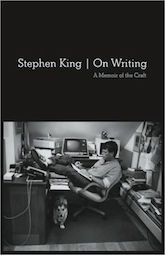
Let’s get one thing clear right now, shall we? There is no Idea Dump, no Story Central, no Island of the Buried Bestsellers; good story ideas seem to come quite literally from nowhere, sailing at you right out of the empty sky: two previously unrelated ideas come together and make something new under the sun. Your job isn’t to find these ideas but to recognize them when they show up. —Stephen King
Back when I was trying to break into print and the rejections were mounting, I picked this one up in hardback and after my second time through, I went ahead and grabbed it on audio, too. It’s a book I listen to every few years as a reminder. Hearing him tell his story with candor, humor and common sense advice never gets old and I nearly always pick up some new useful bit. It’s such an intimate book, especially if you’re listening to him read it. It’s honest and funny and at times, poignant. It gave me a sense of connection to someone who had made it into the park I was still trying to peek into and it felt like he was helping me along the way. His autobiography is a reminder that writers are grown out of wonder. Like Bradbury in his essay, King also takes us back to the things that made him go gosh-wow.
This one is like having Obi-Wan Kenobi in your back pocket.
From Idea to Story in 90 Seconds by Ken Rand
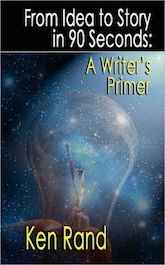
This is how it’s done: First, you get an idea, next, you translate that idea into a story; then you edit the story; and finally, you market the result. —Ken Rand
I took Ken’s class based on this book before I had the opportunity to read it. He’s passed on so that workshop is lost to us, but the book is fantastic in its own right. Ken crashed with me while he presented at a local workshop and I snuck into his class. During one of the 90 second brain-storming exercises, I came up with one of my better stories and got the closest I’ve ever been to a Nebula. It gave me proof that I could find a story anywhere— great as a confidence builder for new writers.
The book is short and practical, teaching you how ladle out stories by the bowlful from what Ken calls the Cosmic Stew. It’s available from Fairwood Press along with Ken’s also-amazing self-editing book The Ten Percent Solution.
And those are my five. I can’t imagine my career without them. Your mileage, of course, may vary.
 Ken Scholes is the award-winning, critically-acclaimed author of five novels and over fifty short stories. His work has appeared in print since 2000. Hymn, the final novel in his Psalms of Isaak series, is published by Tor Books. Ken’s eclectic background includes time spent as a label gun repairman, a sailor who never sailed, a soldier who commanded a desk, a fundamentalist preacher (he got better), a nonprofit executive, a musician and a government procurement analyst. He has a degree in History from Western Washington University. Ken is a native of the Pacific Northwest and makes his home in Cornelius, Oregon, where he lives with his twin daughters.
Ken Scholes is the award-winning, critically-acclaimed author of five novels and over fifty short stories. His work has appeared in print since 2000. Hymn, the final novel in his Psalms of Isaak series, is published by Tor Books. Ken’s eclectic background includes time spent as a label gun repairman, a sailor who never sailed, a soldier who commanded a desk, a fundamentalist preacher (he got better), a nonprofit executive, a musician and a government procurement analyst. He has a degree in History from Western Washington University. Ken is a native of the Pacific Northwest and makes his home in Cornelius, Oregon, where he lives with his twin daughters.










